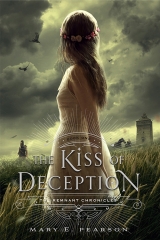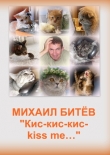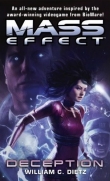
Текст книги "The Kiss of Deception"
Автор книги: Mary E. Pearson
Жанры:
Научная фантастика
,сообщить о нарушении
Текущая страница: 6 (всего у книги 20 страниц)
I plucked one of his forbidden berries and popped it in my mouth. A rush of flavor and memory engulfed me. I closed my eyes and saw Walther’s face, Bryn’s, Regan’s, berry juice dripping from their chins. I saw the four of us running through woods, scrambling over moss-covered ruins of the Ancients without care, never thinking our own world would one day change too.
Stair steps, Aunt Bernice called us, all almost exactly two years apart, like my mother and father, bred on the Timekeeper’s strict schedule, and of course, once a First Daughter was produced, the breeding stopped altogether. My father’s glance at my mother on my last day in Civica flashed through me, the last memory of them I’d probably ever have, and then his comment about her beauty on their wedding day. Was it the rigors of duty that made him shove her aside and forget about love? Had he ever loved her?
A nice little trick if you can find it.
But Pauline did.
I plucked a handful of berries and nestled down against a palm near the brook. The short day had already brought so much turmoil, and the day before hadn’t brought any less. I was weary of it and soaked in the tranquillity of the devil’s garden, listening to the gurgle of his brook and shamelessly savoring his fruit one plump morsel at a time.
I had just closed my eyes when I heard another sound. My eyes shot open. The distant whinny of Otto? Or was it only the whistle of wind down the canyon? But there was no wind.
I turned my head and heard the unmistakable thump of hooves—heavy and methodical. My hand went to my side, but my knife was gone. I’d left it hanging on the horn of my saddle when I stripped off my shirt. I only had time to scramble to my feet when an enormous horse appeared—with Rafe sitting atop it.
The devil had arrived. And some strange part of me was glad.
CHAPTER FIFTEEN
He stopped some distance away, as if waiting for a signal from me to proceed. My stomach twisted. His face was different today. Still striking, but yesterday he was decidedly angry from the moment he saw me and I felt he wanted to hate me.
Today he wanted something else.
In the glare of the overhead sun, shadows slashed across his cheekbones, and his eyes were a deeper cutting blue against the muted landscape. Framed in dark lashes, they were the kind of eyes that could stop anyone and make them reconsider their steps. He made me reconsider mine. I swallowed. He casually held up two baskets in one hand as if they were an explanation for his presence. “Pauline sent me. She said you forgot these.”
I resisted rolling my eyes. Of course she did. The ever-resourceful Pauline. Even in her weakened state, she was still a steadfast member of the queen’s court, trying to weave possibilities for her charge from afar, and of course, she was the sort that even Rafe couldn’t refuse.
“Thank you,” I answered. “She was taken ill and had to return to the inn, but I forgot to get her baskets before she left.”
He nodded as if it all made perfect sense and then his gaze passed over my shoulders and bare arms. My chemise was apparently not as modest as I had thought it to be, but there was little I could do to remedy that now. Along with my knife, my shirt was still hanging on Otto’s saddle. I walked closer to retrieve the baskets, trying to ignore the flash of heat spreading across my chest.
His horse was monstrous and made my Ravian seem like a child’s pony. It was clearly not built for speed, but for strength, and maybe intimidation. Rafe sat so high on the saddle he had to lean down to hand me the baskets.
“I’m sorry if I intruded,” he said as I took the baskets from him.
His apology caught me off guard. His voice was polite and genuine, holding none of the rancor of yesterday.
“A kindness isn’t an intrusion,” I replied. I looked up at him, and before I could cut off my own words, I heard myself inviting him to stay and water his horse. “If you have the time, that is.” What had I done? Something about him greatly troubled me, but something enthralled me too, so much so that I was being far too reckless with my invitations.
His brows lifted as he considered my offer, and for a moment, I prayed he would say no. “I think I have the time,” he said. He swung down from his horse and led it to the pool, but it only sniffed at the water. It was a black and white piebald, and though formidable in stature, quite possibly the most beautiful horse I had ever seen. It’s coat gleamed, and the feathers on its fore and hind legs were shimmering white clouds that danced when it walked. Rafe dropped the lead and turned back to me.
“You’re gathering berries?”
“Berdi needs them for the festival.”
He walked closer, stopping just an arm’s length away, and surveyed the canyon. “Way out here? There are none closer to the inn?”
I held my ground. “Not like the berries here. These are twice the size.”
He stared at me as if I hadn’t spoken. I knew that something else was going on here. Our gazes were locked as if our wills were battling on some mysterious plane, and I knew if I turned away, I would lose. Finally he looked down for a moment, almost contritely, chewing on his lower lip, and I breathed.
His expression softened. “Do you need help?” he asked.
Help? I fumbled with the baskets, dropping one. “You’re in distinctly better spirits today than you were yesterday,” I said as I stooped to pick it up.
“I wasn’t in poor spirits.”
I straightened. “Yes you were. You were an ill-mannered boor.”
A grin slowly lifted the corners of his mouth, that same maddening, arrogant, secretive grin of last night. “You surprise me, Lia.”
“In what way?” I asked.
“In many ways. Not least of which is your terrible fear of rabbits.”
“Fear of rabbits—” I blinked slow and hard. “You shouldn’t believe everything people tell you. Pauline has been known to generously embroider the truth.”
He slowly rubbed his chin. “Don’t we all?”
I studied him, no less than I had Gwyneth, though he was even more of a puzzle. Everything he said seemed to carry a gravity beyond his stated words.
I’d make Pauline pay for this, beginning with a lecture about rabbits. I turned and walked to the berry bushes. Setting a basket down at my feet, I began filling the other. Rafe’s footsteps crunched on the ground behind me. He stopped at my side and picked up the extra basket. “Truce? For now? I promise not to be an ill-mannered boor.”
I kept my eyes on the berry bush in front me, trying to suppress a grin. “Truce,” I answered.
He plucked several berries, staying close to my side, dropping a few into my basket as though he was getting ahead of me. “I haven’t done this since I was a child,” he said.
“Then you’re doing quite well. Not one has gone in your mouth yet.”
“You mean I’m allowed to do that?”
I smiled inwardly. His voice was almost playful, though I couldn’t imagine any such expression on his face. “No, you’re not allowed,” I replied.
“Just as well. It’s not a taste I should acquire. There aren’t many berry bushes where I’m from.”
“And just where would that be?”
His hand paused on a berry like it was a monumental decision whether to pluck it or not. He finally pulled and explained he was from a small town in the southernmost part of Morrighan. When I asked the name, he said it was very small and had no name.
It was obvious he didn’t want to reveal exactly where he was from. Maybe he was escaping an unpleasant past like me, but that didn’t mean I had to swallow his story with the first bite. I could play with him a little. “A town with no name? Really? How very odd.” I waited for him to scramble, and he didn’t disappoint me.
“It’s only a region. A few scattered dwellings at most. We’re farmers there. Mostly farmers. And you? Where are you from?”
A nameless region? Maybe. And he was strong, fit, tanned from the sun like a farmer might be, but there was also so much that seemed very unfarmerish about him—the way he spoke, even the way he carried himself—and especially his unnerving blue eyes. They were fierce, like a warrior’s. They weren’t the eyes of a content farmer passing his days turning the soil.
I took the berry still poised in his fingers and popped it in my mouth. Where was I from? I narrowed my eyes and smiled. “A small town in the northernmost part of Morrighan. Mostly farmers. Only a region, really. A few scattered dwellings. At most. No name.”
He couldn’t restrain a chuckle. “Then we come from opposite but similar worlds, don’t we?”
I stared at him, entranced that I was able to make him laugh. I watched his smile slowly fade from his face. Gentle lines still creased his eyes. His laugh seemed to relax everything about him. He was younger than I originally thought, nineteen maybe. I was intrigued by—
My eyes widened. I had been studying him and hadn’t even answered his question. I looked away, my chest thumping, and returned with renewed vigor to my half-filled basket, plucking several green berries before his hand reached out and touched mine.
“Shall we walk for a bit?” he suggested. “I think this bush is stripped clean unless Berdi wants sour fruit.”
“Yes, maybe we should move on.”
He let go of my hand, and we walked a little farther down the canyon, gathering berries as we went. He asked me how long I had worked at the inn, and I told him only a few weeks. “What did you do before that?”
Anything I did in Civica wasn’t worth mentioning. Almost. “I was a thief,” I said, “but decided to try my hand at making an honest living. So far, so good.”
He smiled. “But at least you have something to fall back on?”
“Exactly.”
“And your parents? Do you see them often?”
Since the day of my escape with Pauline, I hadn’t discussed them with anyone. There will be a bounty on my head. “My parents are dead. Did you enjoy the venison last night?”
He acknowledged my abrupt change of subject with a nod. “Very much. It was delicious. Gwyneth brought me a generous helping.”
I couldn’t help but wonder what else she had been generous with. Not that she ever overstepped the bounds of propriety, but she did know how to lavish attention on certain patrons, and I wondered if Rafe had been one of them. She had definitely taken notice of him when he walked into the tavern, but then, so had I.
“You’ll be staying on, then?”
“For a time. At least through the festival.”
“You’re devout?”
“About some things.”
It was a neatly evasive answer that still left me wondering if his principal interest in the festival was food or faith. The annual festival was as much about food and drink as it was about holy observances, some partaking in more of one than the other.
“I noticed the nicks on your hands. Did you get them from your work?”
He examined one hand in front of him like he was just noticing the nicks too. “Oh, these. Almost healed now. Yes, from my work as a farmhand, but I’m between jobs right now.”
“If you can’t pay, Berdi will strip it from your hide.”
“Berdi needn’t worry. My lack of work is only temporary. I’ve enough to pay my way.”
“Then your hide is spared. Though there’s always some work around the inn you could do in trade. The cottage, for instance, is in need of a new roof. Then Berdi could rent it out properly and make a better profit.”
“Then where would you stay?”
How did he know I stayed in the cottage? Was it apparent from the direction I was walking last night? Still, I could have been traveling a back path to any number of homes a short walk from the inn—unless he had watched me all the way to my door last night.
As if he could see the thoughts churning in my head, he added, “Pauline told me she was going to the cottage to rest when she asked me to bring you the baskets.”
“I’m sure the loft will suit Pauline and me just as well as Berdi’s paying guests. I’ve stayed in much worse.”
He grunted as though he didn’t believe me, and I wondered how he perceived me. Did privilege show in my face or speech? It showed nowhere else. My nails were chipped, my hands chapped, and my clothing torn. I suddenly felt pride in my difficult trek from Civica to Terravin. Hiding our tracks was our priority over comfort, and more than once, we slept on hard stony ground without the benefit of a warm fire.
The canyon narrowed, and we climbed a gentle path until we emerged on a grassy plateau that looked out on the sea. The winds were strong here, whipping at the loose tendrils of my hair. I reached up to push them back and surveyed the ocean, purple with frosted caps, a wild tempest, alluring and frightening. The warm temperatures of the canyon vanished, and I felt the chill on my bare shoulders. Waves swirled and crashed on the jagged rocks in an inlet far beneath us, leaving foamy trails behind.
“I wouldn’t get close,” Rafe warned. “The cliffs may be unstable.”
I looked down at the fissures that reached out like claws from the cliff edge and took a step back. We were surrounded only by windswept grass. “I suppose there are no berry bushes up here,” I said, stating the obvious.
“None,” he answered. His eyes lifted from the fissures to me, long seconds passing, and I felt the weight of his attention as if he were studying me. He caught himself and looked away, staring farther down the coast.
I followed the line of his gaze. In the distance, the enormous bleached remains of two massive domes that had caved in on the windward side rose high above the surf like the ribbed carcasses of giant sea creatures tossed to the shore.
“They must have been impressive once,” I said.
“Once? They still are, don’t you think?”
I shrugged. The texts of Morrighan were riddled with caution about the Ancients. I saw sadness when I looked at what was left of them. The demigods who had once controlled the heavens had been brought low, humbled to the point of death. I always imagined I heard their crumbled masterpieces singing an endless mourning dirge. I turned, looking at the wild grass shivering across the plateau. “I see only reminders that nothing lasts forever, not even greatness.”
“Some things last.”
I faced him. “Really? And just what would that be?”
“The things that matter.”
His reply surprised me both in substance and delivery. It was oddly quaint, naпve even, but heartfelt. Certainly not what I’d expect to hear from someone with a hard edge like him. I could easily challenge him. The things that mattered to me hadn’t lasted. What I wouldn’t give to have my brothers here in Terravin or to see love on the faces of my parents once again. And the things that mattered to my parents hadn’t lasted either, like the tradition of a First Daughter. I was a grave disappointment to them. My only response to him was a noncommittal shrug.
He frowned. “Do you disdain everything of the old ways? All the traditions of the ages?”
“Most. That’s why I came to Terravin. Things are different here.”
His head cocked to the side, and he edged closer. I couldn’t move without stepping toward the fissures of the cliff. He was only inches from me when he reached out, his fingers brushing my shoulder. Heat streamed through me.
“And what’s this?” he asked. “It bears some resemblance to tradition. To mark a celebration?”
I looked to where he had touched my skin. My chemise had slipped from my shoulder, revealing a portion of the lion claw and the vines of Morrighan. What had they done that I couldn’t be rid of this beast? Damn the artisans!
I yanked at my chemise to cover it. “It’s a terrible mistake. That’s what it is. Little more than the marks of grunting barbarians!”
I was incensed that this damnable kavah refused to let me go. I tried to brush past him, but a strong jerk left me suddenly facing him again, his hand securely circling about my wrist. We didn’t speak. He only stared at me, his jaw tense, as if he was holding back words.
“Say it,” I finally said.
He released his grip. “I already told you. Be careful where you step.”
I waited, thinking he would say more, do more. I wanted more. But he made no move.
“Is that all?” I asked.
His nostrils flared as he took a deep breath, and his chest heaved as he let it out again. “That’s all,” he said, and he turned and walked back down the path toward the canyon.
His bite will be cruel, but his tongue cunning,
His breath seductive, but his grip deadly.
The Dragon knows only hunger, never sated,
Only thirst, never quenched.
–Song of Venda
CHAPTER SIXTEEN
Meet me at the temple ruins
east of the cottage. Come alone.
I turned the torn piece of paper over in my hands. The writing was nearly illegible, clearly written in haste. Who was this lunatic who thought I was crazy enough to travel into the forest and meet him alone based on a scrawled note tucked into my wardrobe?
When I found the cottage door ajar upon my return, I knew something was amiss. Pauline was careful about such things, never leaving anything out of place. I warily pushed the door open the rest of the way, and when I was assured the cottage was empty, searched it. Nothing was missing, though the remaining royal jewels could easily be found in a pouch in my saddlebag. It wasn’t a thief who had paid us a visit. The wardrobe door was also ajar, and that was where I had found the note, jabbed over a hook and not to be missed.
The command, Come alone, was the most unsettling.
I looked at the note again and drew in a sharp breath. There was no name on it. Maybe this note wasn’t for me. Maybe it was for Pauline. Perhaps Mikael had arrived at last! Pauline would be so—
I whirled and looked out the open doorway into the forest. But why a note? Why wouldn’t he just go straight into the tavern and sweep her into his arms? Unless he had a reason to hide. I shook my head and wrestled over what to do. I couldn’t show Pauline the note. What if it wasn’t from Mikael?
But what if it was, and I ignored it? Especially now with—
I threw open the wardrobe and put on Pauline’s black cloak. It was almost dusk. The dark fabric would give me some cover in the forest. I hoped the ruins weren’t a far trek and could be easily found. I unsheathed my knife and gripped it in my hand beneath the cloak—just in case it wasn’t Mikael who had left the note.
I traveled directly east, as much as the terrain would allow. The trees grew denser, and the moss on their northern sides thicker as less light filtered to the forest floor. There was no skittering of squirrels or birds, as if something had passed this way very recently.
The last glimpse of Terravin disappeared behind me. I thought about the Ancients and the unexpected places their ruins were strewn. My brothers and I called all the ruins either temples or monuments because we had no notion of what their original uses were. The few inscriptions that had survived the ages were in ancient languages, but the rubble left behind spoke of grandeur and opulence—like the immense ruins Rafe and I had gazed upon.
Whatever I had said today as we looked at them had disturbed him. Was it eschewing traditions? Or comparing artisans to grunting barbarians? Could it be his own father was an artisan? Or worse, a barbarian? I dismissed that possibility, because Rafe was quite articulate when he wanted to be, and contemplative, as though a great weight pressed on him. The things that matter. He had a tender side too, which he tried to hide. What weakness had made him share it with me?
My steps slowed. Just ahead was a wall of moss, its jagged edge softened by creeping forest foliage. Ferns sprouted from crevices, making it almost unrecognizable as anything manmade. I circled around, trying to glimpse any color besides green beyond the wall, looking for the warmth and brown of human flesh.
I heard what I thought was scraping and then a ruffle of air. A horse. Somewhere hidden behind the walls, my mysterious host was hiding his steed. That meant he was here too. I pushed back my cloak so my throwing arm was free and adjusted my grip on the knife.
“Hello?” I called. I heard the crunching of footsteps, and someone stepped out from behind the wall. I screamed and ran toward him before he could even speak. I hugged him, kissed him, whirled around in his arms, so full of joy all I could say was his name over and over again.
He finally stepped back and cupped my face in his hands. “Had I known you’d be so happy to see me, I’d have been here sooner. Come, let’s go inside.” He led me into the ruin as if he was taking me into a grand manor, then sat me down on a tumbled block of stone. He looked me over, making a show of assessing my health, turning my face first to one side and then the other. He finally nodded, judging me fit, and smiled. “You did well, little sister. The finest royal scouts have been tracking you for weeks.”
“I learned from the best, Walther.”
He laughed. “Without a doubt. I knew when the stable boy said he saw you heading north that meant you’d be going south.” He raised an amused brow. “But officially I had to lead a party north to keep up your ruse. I didn’t want to direct anyone straight to you, and up north I managed to leave more traces of your presence. When time afforded it, I came south with a few of the best to look for you.”
“You trust them?”
“Gavin, Avro, Cyril. You needn’t ask.”
They were Walther’s closest comrades in his unit. Cyril was a thin, scruffy fellow. It had to have been him that Pauline spotted in the tavern last night.
“So you approve of what I did?” I asked hesitantly.
“Let’s just say I wasn’t overly surprised.”
“And Bryn and Regan?”
He sat beside me and looped his arm over my shoulder, pulling me close. “My dear sweet sister, your brothers all love you as much as we ever did, and none of us blame you for wanting more from a marriage, though we’ve all been worried for your well-being. It’s only a matter of time before someone discovers you.”
I jumped up, shed my cloak, and spun for him. “Really? Look at me. If you didn’t already know who I was, would you have guessed I was Princess Arabella, First Daughter of Morrighan?”
He frowned. “Ragged clothes?” He grabbed my hand and examined it. “Chipped nails? Those aren’t enough to disguise what’s inside. You’ll always be you, Lia. You can’t run from that.”
I pulled my hand away. “Then you don’t approve.”
“I only worry. Back in Civica, you’ve enraged powerful people.”
“Mother and Father?”
He shrugged. “Mother won’t speak of it, and Father dutifully had a bounty posted for your arrest and return.”
“Only dutifully?”
“Don’t get me wrong. He’s humiliated and furious, and that’s only half of it. It’s been almost a month, and he’s still blustering around, but it’s still only a single small notice in the village square, and to my knowledge, no other bills have been sent out. Maybe that was as far as his cabinet could push him. Of course, they’ve had other pressing matters to deal with.”
“Other trouble besides me?”
He nodded. “Marauders have been creating all manner of bedlam. We think it’s only one or two small bands, but they disappear into the night like spirit wolves. They’ve destroyed key bridges in the north where most of our troops are positioned and created some panic in the outer hamlets.”
“Do you think it’s Dalbreck? Has a broken alliance created that much animosity?”
He shrugged. “No one knows for sure. Relations with Dalbreck have certainly eroded since you left, but I suspect this is the handiwork of Vendans taking advantage of our current situation. They’re trying to diminish our ability to mobilize the Guard, which may mean they’re planning a larger advancement of some kind.”
“Into Morrighan?” I couldn’t hide my shock. Any skirmishes with Venda had always taken place in the Cam Lanteux when they tried to establish outposts, never on our own soil.
“Don’t worry,” he said, a bit too quickly. “We’ll keep them out. We always do.”
“Even though they multiply like rabbits?”
He smiled. “Rabbits make good eating, you know?”
He stood and took a few steps, then turned to face me again, brushing back his unruly hair with his fingers. “But the worries and rage of Father are nothing compared to those of the Scholar.” He shook his head and grinned. “Oh, my little sister. What have you done?”
“What?” I asked innocently.
“It seems that something of great value to the Scholar has disappeared. At exactly the same time you did. He and the Chancellor have turned the citadelle upside down looking for it. All surreptitiously of course, because whatever was taken apparently isn’t a catalogued piece of the royal collection. At least that’s the rumor among the servants.”
I pressed my hands together and grinned. I couldn’t hide my glee. Oh, how I wish I had seen the Scholar’s face when he opened what he thought was his secret drawer and found it empty. Almost empty, that is. I’d left a little something for him.
“So you delight in your thievery?”
“Oh, very much so, dear brother.”
He laughed. “Then so do I. Come tell me about it. I’ve brought some of your favorites.” He led me to a corner where he had spread a blanket. From a basket he pulled a sealed cask of sparkling cherry muscat, the bubbly vintage of the Morrighan vineyards that I adored but was only allowed to drink on special occasions. He also unwrapped half a wheel of sweet fig cheese and the toasted sesame crackers from the village baker. These were the tastes of home I hadn’t even realized I missed. We sat on the blanket, and I ate and drank and recounted the details of my theft.
It was the day before the wedding, and the Scholar was at the abbey officiating at the signing of the last documents. I still hadn’t made my final decision to flee, but as I sat in the darkness of my dressing chamber stewing, my well-honed animosity toward the Chancellor and Scholar reached its sharpest edge. They hadn’t even tried to hide their elation over my imminent departure when I went to the Chancellor’s offices earlier that morning to give my royal artifacts back to the collection. My crown, my rings, my seal—even my smallest jeweled hair baubles—the Chancellor made it clear that none of it could leave with me when I went to Dalbreck. He said my purpose wasn’t to enlarge the treasury of another kingdom.
The Scholar was there acting as witness and recorder. I had noticed he seemed especially eager for me to be on my way, rushing through his ledger, nervously shifting from one foot to another. I found it curious, since the Scholar was usually rigid and assertive in all his dealings with me. Just before I walked out the door, I was slammed with a thought—you have secrets—and I spun around. I saw the surprise on both their faces.
“Why have you always hated me?” I had asked.
The Scholar froze, deferring to the Chancellor. The Chancellor couldn’t even be bothered to look at me when he answered and went back to reviewing the ledger. He clucked like I was a foolish twit, and then in his snipped dismissive voice he said, “You’ve always asked the wrong questions, Princess. Maybe you should ask why I would have any reason to like you?” But the Scholar never moved, never took his eyes off me, as if he was waiting to see what I would do next.
Walther listened attentively. I explained how I turned our encounter over and over in my head as I stewed in my dressing chamber that afternoon, and the words hit me again. You have secrets. Of course they did, and I headed straight for the Scholar’s offices, since I knew he was at the abbey.
“It wasn’t hard to find, a false drawer on a bureau and one of my long hairpins easily picked the simple lock.”
“Are you going to leave me waiting in suspense? What did you steal?”
“That’s the strange part. I’m not sure.”
He cocked his head to the side, smirking, as if I was being coy.
“Truly, Walther. It was a few loose papers and two small books. Very thin old volumes. They were wrapped in a soft leather sleeve and placed in a gold box, but I can’t read either of them. They’re in ancient or foreign tongues.”
“Why would he hide them? He has his stable of lackeys who could translate them.”
“Unless they already did.” Which meant they should be part of the official collection. All recovered artifacts from ruins belonged to the realm, even ones found by soldiers in distant lands. It was a crime to secrete them away.
We both knew the Scholar was the Royal Scholar for good reason. He was not only the expert on the Morrighan Book of Holy Text but was also well versed in the translation of other ancient languages—though maybe not as gifted as some supposed. I had seen him stumble in some of the simplest dialects, and when corrected by me, he’d been undone with anger.
“Why don’t you translate them?”
“And just when would I have the leisure, my dear Prince Walther? Between being a fugitive princess, the caretaker of three donkeys, sweeping out rooms, and serving meals, I’m lucky if I have time to bathe. We aren’t all leading the regal life.” I used my most royal haughty tone, making him laugh. I didn’t mention my other activities, like berry picking with handsome young men. “Besides,” I added, “translating isn’t a small task when one has no knowledge of the language. The only clues I have are cataloging notations in the loose papers. One of the volumes is titled Ve Feray Daclara au Gaudrel, and the other is from Venda.”
“A volume from Venda? The barbarians read?”
I smiled. “Well, at least at one time they did. It might very well be the jeweled gold box that they were in that the Chancellor is so sorely missing. Its worth alone would probably allow him to add yet another wing to his sprawling country manor.”
“Or maybe it’s a new find, and the Scholar’s afraid you’ll translate it first and steal his thunder. He does have his position to keep secure.”
“Maybe,” I answered. But somehow I was sure the volumes weren’t new, that they had been hidden in that dark drawer for a very long time, maybe so long even the Scholar had forgotten them.
Walther squeezed my hand. “Be careful, Lia,” he said solemnly. “Whatever the reason, they want it back very much. I’ll discreetly nose around when I get back and see if Mother or Father knows anything about it. Or maybe the Viceregent.”
“Don’t let on that you’ve seen me!”
“Discreetly,” he repeated.
I nodded. “Enough about the Scholar,” I said. The conversation was becoming too somber, and I wanted to enjoy this gift of time with Walther. “Tell me other news from home.”








